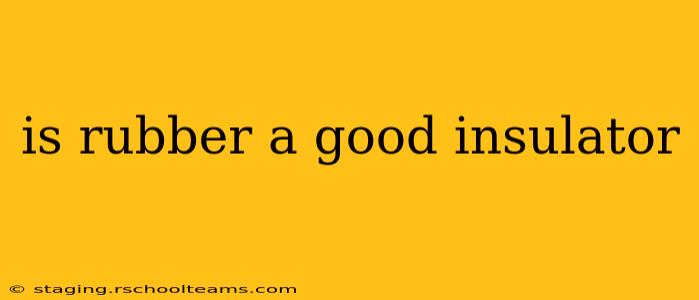Rubber's insulating properties are a crucial factor in various industries, from electrical engineering to construction. But is rubber a good insulator? The answer, like many things in material science, is: it depends. This comprehensive guide will delve into the nuances of rubber's insulating capabilities, exploring different types, applications, and factors affecting its performance.
What Makes a Material a Good Insulator?
Before we dive into rubber, let's understand what constitutes a good insulator. Good insulators have a high electrical resistivity, meaning they resist the flow of electric current. This resistance is due to the material's atomic structure; electrons are tightly bound, making it difficult for them to move freely and conduct electricity. Good thermal insulators, on the other hand, resist the flow of heat.
Is Rubber a Good Electrical Insulator?
Yes, rubber is generally considered a good electrical insulator. Its high resistivity prevents the flow of electricity, making it suitable for applications where electrical safety is paramount. However, it's essential to note that not all rubbers are created equal. The insulating properties vary significantly depending on the type of rubber and its composition.
Different Types of Rubber and Their Insulating Properties
- Natural Rubber (NR): Possesses excellent insulating properties, making it a common choice in many applications.
- Styrene-Butadiene Rubber (SBR): Offers good insulation, although generally slightly less effective than NR.
- Neoprene (Polychloroprene): Known for its superior resistance to oils, chemicals, and weathering, making it suitable for demanding environments. Its insulating properties are comparable to NR and SBR.
- Silicone Rubber: Excellent heat resistance and good dielectric properties, making it ideal for high-temperature applications.
- Ethylene Propylene Rubber (EPR): Excellent resistance to heat and ozone, often used in high-voltage applications. It possesses good insulating properties.
Is Rubber a Good Thermal Insulator?
While rubber is a good electrical insulator, its effectiveness as a thermal insulator is more moderate. Compared to materials like fiberglass or polyurethane foam, rubber's thermal insulation properties are less pronounced. It does, however, offer some degree of thermal insulation, which can be beneficial in certain applications. The thermal conductivity varies depending on the type of rubber and its density. Higher density rubbers generally offer slightly better thermal insulation but still fall short of specialized thermal insulation materials.
What Factors Affect Rubber's Insulating Properties?
Several factors can influence the insulating capabilities of rubber:
- Type of Rubber: As discussed earlier, different types of rubber have varying insulating properties.
- Temperature: Extreme temperatures can degrade rubber's insulating properties.
- Age and Degradation: Over time, rubber can degrade, leading to a reduction in its insulating effectiveness. Exposure to UV light, ozone, and chemicals accelerates this process.
- Additives and Fillers: The presence of additives and fillers in the rubber compound can affect its insulating properties. Some additives might enhance insulation, while others could reduce it.
- Moisture: Moisture can reduce the insulating properties of rubber, as it can conduct electricity.
How is Rubber Used as an Insulator?
Rubber's insulating properties are exploited in numerous applications, including:
- Electrical Wiring Insulation: Protecting electrical wires and cables.
- Protective Gloves and Footwear: Providing electrical protection for workers.
- Insulating Mats and Pads: Used in electrical work to prevent shocks.
- Gaskets and Seals: Used in electrical equipment to prevent leakage and maintain insulation.
- High-voltage cable insulation: Protecting high-voltage cables from arcing and short circuits.
What are the alternatives to rubber for insulation?
Many alternative materials offer superior electrical or thermal insulation. These include plastics (like PVC, Teflon), ceramics, and various specialized foams. The best choice depends on the specific application requirements.
Conclusion
Rubber is a good electrical insulator, and its suitability for thermal insulation depends on the application. The specific properties vary greatly based on rubber type, temperature, and other environmental factors. Choosing the right type of rubber for insulation is crucial for ensuring safety and performance in any application. Understanding these nuances is essential for making informed decisions in electrical and other engineering applications.
